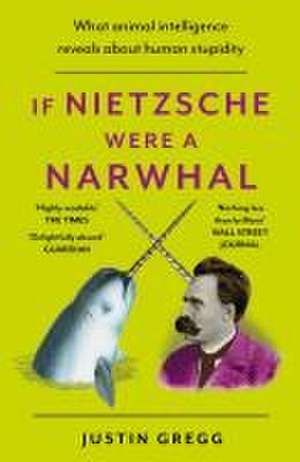If Nietzsche Were a Narwhal
Autor Justin Greggen Limba Engleză Paperback – 18 ian 2024
| Toate formatele și edițiile | Preț | Express |
|---|---|---|
| Paperback (3) | 52.90 lei 3-5 săpt. | +26.08 lei 7-13 zile |
| HODDER AND STOUGHTON LTD – 18 ian 2024 | 52.90 lei 3-5 săpt. | +26.08 lei 7-13 zile |
| HODDER AND STOUGHTON LTD – 9 aug 2022 | 82.75 lei 3-5 săpt. | +41.90 lei 7-13 zile |
| BACK BAY BOOKS – 2 oct 2023 | 109.28 lei 3-5 săpt. | |
| Hardback (1) | 107.55 lei 3-5 săpt. | +54.92 lei 7-13 zile |
| Hodder & Stoughton – 26 ian 2023 | 107.55 lei 3-5 săpt. | +54.92 lei 7-13 zile |
Preț: 52.90 lei
Preț vechi: 69.67 lei
-24% Nou
Puncte Express: 79
Preț estimativ în valută:
10.12€ • 10.82$ • 8.44£
10.12€ • 10.82$ • 8.44£
Carte disponibilă
Livrare economică 27 martie-10 aprilie
Livrare express 13-19 martie pentru 36.07 lei
Preluare comenzi: 021 569.72.76
Specificații
ISBN-13: 9781399712477
ISBN-10: 1399712470
Pagini: 308
Dimensiuni: 128 x 196 x 24 mm
Greutate: 0.23 kg
Editura: HODDER AND STOUGHTON LTD
Colecția Hodder Paperbacks
ISBN-10: 1399712470
Pagini: 308
Dimensiuni: 128 x 196 x 24 mm
Greutate: 0.23 kg
Editura: HODDER AND STOUGHTON LTD
Colecția Hodder Paperbacks
Notă biografică
Justin Gregg is a Senior Research Associate with the Dolphin Communication Project and an Adjunct Professor at St. Francis Xavier University where he lectures on animal behavior and cognition. Originally from Vermont, Justin studied the echolocation abilities of wild dolphins in Japan and The Bahamas. He currently lives in rural Nova Scotia where he writes about science and contemplates the inner lives of the crows that live near his home.
Cuprins
Introduction The human brand of intelligence is really not all that exceptional (from an evolutionary standpoint), and is rarely the best solution for how to live a good life. Animal thinking has a lot to teach humans about how to live well without overthinking things. Chapter 1: The Why Specialists The human capacity for causal inference is unsurpassed in the animal kingdom. But animals seem to get by just fine (and sometimes even better) without needing to know why things happen. Chapter 2: The Fake News Species Humans are experts are manipulating the thoughts of other humans through lies and deception. Animals, on the other hand, are usually quite honest about their feelings and intentions. But being masters of deception isn’t always as advantageous as it might seem. Chapter 3: To Be or Not to Be an Ant Humans have come a long way since a handful of us left the African continent to explore the Earth a few dozen millennia ago. We’re fantastically populous, for a mammalian species. But we aren’t really designed very well for group living. So many other species have hit on solutions for living well in large numbers that could provide lessons for us newfangled city-dwellers. Chapter 4: The Mystery of the Happy Chicken Conscious awareness is not limited to the human species; there’s every reason to believe that a myriad of animals—from the pets on our sofas right down to the spiders in our basement—experience the world in ways not dissimilar to a human. From a biological standpoint, however, consciousness isn’t really that big of a deal. Chapter 5: Angry Gay Ducks Humans certainly don’t have a monopoly on morality. Other species live by moral codes, too. And when looking at how non-human species deal with problems of right and wrong, or who gets to have sex with whom, or even the best way to fight a war, most species have hit on solutions that call into question the moral superiority of Homo sapiens. Chapter 6: Death Wisdom Knowledge of our own mortality is arguably a rather crappy knock-on effect of the human brand of intelligence. Other species might well know something of death but are unlikely to dwell on it the way a human poet or philosopher could. Is this kind of death wisdom a good or a bad thing? Chapter 7: Prognostic Myopia Humans excel at predicting and planning for the distant future. No other animal species understand the passage of time like we do. And yet, our minds never evolved to truly feel the future repercussions of our current decisions. Is this skill a benefit or a liability for our species? Chapter 8: Human Exceptionalism Human and animal cognition are not really all that different. In the few areas where humans do something truly exceptional when it comes to intelligence, there is every reason to believe that other species are nonetheless doing a better job than us at living a good life with less complex thinking strategies. Humans could learn a lot from the cognitive solutions offered by those species that are less exceptional than we consider ourselves to be. Epilogue Does the science of animal minds and animal intelligence leave us with a clear understanding of how animals should be treated? Re-thinking the nature of human intelligence and exceptionalism just might provide us with a few signposts showing us why we should also re-think our relationship to the living creatures with whom we share this planet.
